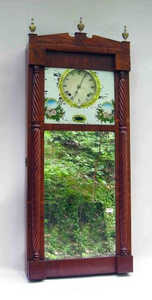Joseph Ives (1782-1862) of Connecticut was an inventor and clockmaker. Wooden clock movements were in vogue when Joseph entered the clock trade. He followed this trend and fashioned wooden movements. Soon, however, he realized brass movements would be better, especially those made from rolled sheet brass, so he developed a rolling pinion, a small gear with teeth that fit into those of a larger gear or rack. Normally, a rolling pinion has fewer than twenty teeth called leaves.
In addition, Ives patented a steel spring. He is credited with a possible American first when he developed this successful clock spring. Until then, only English clockmakers had made and used steel springs successfully.
He headed Joseph Ives & Company of Bristol, Connecticut, from 1818 to 1819. Sometime later, Ives was credited with inventing the wagon-spring clock. He used these flat springs that resembled the flat leaf springs on a wagon to power clock movements. Around 1826, Ives moved to Brooklyn, New York, and for about five years made wagon-spring clocks. He served as a guiding light for theIves business until his death in 1862.
Among Ives’ clock creations is the “Duncan Phyfe” or “Brooklyn”-type wagon-spring clock. The dial on this clock is decorated with a vase of flowers and a painted picture on the tablet. He also developed a thirty-day, wagon-spring, time-only clock, in

